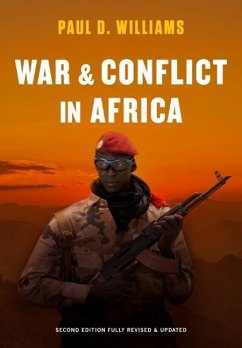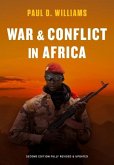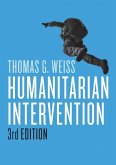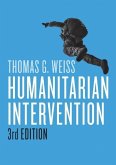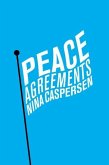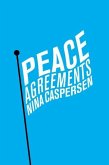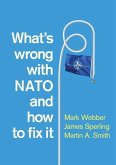After the Cold War, Africa earned the dubious distinction of being the world's most bloody continent. But how can we explain this proliferation of armed conflicts? What caused them and what were their main characteristics? And what did the world's governments do to stop them?
In this fully revised and updated second edition of his popular text, Paul Williams offers an in-depth and wide-ranging assessment of more than six hundred armed conflicts which took place in Africa from 1990 to the present day - from the continental catastrophe in the Great Lakes region to the sprawling conflicts across the Sahel and the web of wars in the Horn of Africa. Taking a broad comparative approach to examine the political contexts in which these wars occurred, he explores the major patterns of organized violence, the key ingredients that provoked them and the major international responses undertaken to deliver lasting peace.
Part I, Contexts provides an overview of the most important attempts to measure the number, scale and location of Africa's armed conflicts and provides a conceptual and political sketch of the terrain of struggle upon which these wars were waged.
Part II, Ingredients analyses the role of five widely debated features of Africa's wars: the dynamics of neopatrimonial systems of governance; the construction and manipulation of ethnic identities; questions of sovereignty and self-determination; as well as the impact of natural resources and religion.
Part III, Responses, discusses four major international reactions to Africa's wars: attempts to build a new institutional architecture to help promote peace and security on the continent; this architecture's two main policy instruments, peacemaking initiatives and peace operations; and efforts to develop the continent.
War and Conflict in Africa will be essential reading for all students of international peace and security studies as well as Africa's international relations.
Hinweis: Dieser Artikel kann nur an eine deutsche Lieferadresse ausgeliefert werden.
In this fully revised and updated second edition of his popular text, Paul Williams offers an in-depth and wide-ranging assessment of more than six hundred armed conflicts which took place in Africa from 1990 to the present day - from the continental catastrophe in the Great Lakes region to the sprawling conflicts across the Sahel and the web of wars in the Horn of Africa. Taking a broad comparative approach to examine the political contexts in which these wars occurred, he explores the major patterns of organized violence, the key ingredients that provoked them and the major international responses undertaken to deliver lasting peace.
Part I, Contexts provides an overview of the most important attempts to measure the number, scale and location of Africa's armed conflicts and provides a conceptual and political sketch of the terrain of struggle upon which these wars were waged.
Part II, Ingredients analyses the role of five widely debated features of Africa's wars: the dynamics of neopatrimonial systems of governance; the construction and manipulation of ethnic identities; questions of sovereignty and self-determination; as well as the impact of natural resources and religion.
Part III, Responses, discusses four major international reactions to Africa's wars: attempts to build a new institutional architecture to help promote peace and security on the continent; this architecture's two main policy instruments, peacemaking initiatives and peace operations; and efforts to develop the continent.
War and Conflict in Africa will be essential reading for all students of international peace and security studies as well as Africa's international relations.
Hinweis: Dieser Artikel kann nur an eine deutsche Lieferadresse ausgeliefert werden.
"War and Conflict in Africa is a fantastic resource for all those who want to learn about the causes, consequences, and solutions to African conflicts. Superbly researched, written, and documented, it manages to cover and synthesize the major debates on war and peace in Africa in a single book."
Séverine Autesserre, Barnard College, Columbia University
"Paul Williams knows the politics of conflict and its resolution backwards and forwards. In this bold second edition, he expands his analysis to explain a worrisome upswing in violence in Africa. Full of helpful insights and mastery of the wide literature, Williams explains how the survival strategies of authoritarian regimes are linked to highly fragmented and complex war zones. Superbly revised and expanded, this brilliant book is a landmark in the literature on the politics of conflict."
William Reno, Northwestern University
"This impressive book provides a comprehensive overview of wars and conflicts in modern Africa, the ideas that have been used to explain them, and the means that have been deployed in the attempt to overcome them. It is absolutely essential reading for anyone concerned with these issues. The central conclusion that "most of the keys required to unlock the secret of building stable peace on the continent are held by local actors" is one that I wholeheartedly endorse."
Christopher Clapham, Centre of African Studies, University of Cambridge
Séverine Autesserre, Barnard College, Columbia University
"Paul Williams knows the politics of conflict and its resolution backwards and forwards. In this bold second edition, he expands his analysis to explain a worrisome upswing in violence in Africa. Full of helpful insights and mastery of the wide literature, Williams explains how the survival strategies of authoritarian regimes are linked to highly fragmented and complex war zones. Superbly revised and expanded, this brilliant book is a landmark in the literature on the politics of conflict."
William Reno, Northwestern University
"This impressive book provides a comprehensive overview of wars and conflicts in modern Africa, the ideas that have been used to explain them, and the means that have been deployed in the attempt to overcome them. It is absolutely essential reading for anyone concerned with these issues. The central conclusion that "most of the keys required to unlock the secret of building stable peace on the continent are held by local actors" is one that I wholeheartedly endorse."
Christopher Clapham, Centre of African Studies, University of Cambridge

